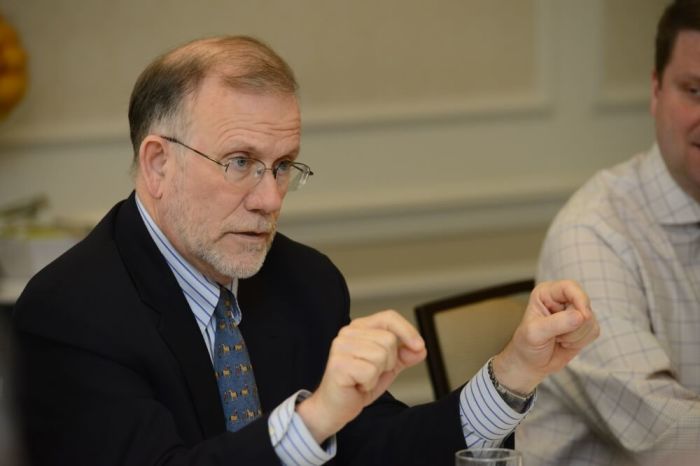Remembering Michael Cromartie, A (Mostly) Gentle Advocate for Christ

"When you get to D.C., find Michael Cromartie. He'll help you."
I still recall those words from my dissertation advisor, Dr. Ken Wald, at the University of Florida as we discussed how to do my research.
Michael was the first person I interviewed for my dissertation, which was the start of our 16-year friendship. This morning (Monday) I learned he passed away after a long battle with cancer.
For that first meeting, Michael could've just answered my questions and had me on my way in only 15 minutes. Instead, he invited me to lunch (he paid), and after the "business" portion of our meeting, he asked me questions, genuinely interested in getting to know me personally.
You'll hear many stories like that if you talk to the people who knew Michael. One of the many things Michael and I had in common was that we were both influenced by Young Life, an evangelical youth ministry. Young Life emphasized relational evangelism, which meant sharing Christ by sharing your life with others. Michael's life epitomized relational evangelism.
Curious, I looked up how many times I mentioned Michael in my dissertation. It was only once. I noted that he was the director (later promoted to vice president) of the Evangelicals in Civic Life program at the Ethics and Public Policy Center. I'm not surprised. My dissertation was on the Christian Right and Michael was a peripheral figure to the people and groups I was writing about. In other ways, though, his fingerprints are all over my work. In that first meeting for my research, Michael helped me understand the intricacies of the players and issues that formed the Christian Right.
His work was often like that. You'll find few mentions of Michael in much of the media's work on faith and politics, especially evangelicals and politics, but his influence is there. Twice a year he gathered reporters for a three day conference, Faith Angle Forum, to listen to scholars discuss issues of faith and public life. The reporters who attend these events often produce works of empathy and insight, which is too often missing in today's media, awash in partisan jeremiads.
Michael understood, though, that it wasn't just the seminars that reporters would find valuable, but the socializing. He made sure that each Faith Angle Forum included Christians and non-Christians, liberals and conservatives. Under Michael's guidance, the Forum was a "safe space," but not in the "protect you from ideas you disagree with"-sense, popular on college campuses these days. Michael created a space in which you could share and listen in an atmosphere of mutual respect. We disagreed without being disagreeable.
I haven't heard whether EPPC will continue the Faith Angle Forum without Michael, but that would be a great way to honor his memory. Michael is irreplaceable, but his work should continue.
While Michael will often be remembered as a quiet, gentle listener who kept his strong political views mostly to himself, this was not always the case. Michael's outspokenness in last year's election was also one of the things I admired about him.
On April 5, 2016, Christian Post reporter Sam Smith and I attended an event hosted by the Institute on Religion and Democracy on "Evangelicals, Trump and 2016 Presidential Politics." Michael was one of several guest speakers.
Michael was more animated than usual in his delivery as he explained that evangelical leaders endorsing Donald Trump were leading a crack up of the Christian Right.
"When Jerry Falwell Jr. has the audacity to come out and endorse Donald Trump, when Robert Jeffress goes on and sells his soul every week on Fox News, encouraging the candidacy of Donald Trump. If this is not a crack up, I don't know what it is," he said.
It was a jarring moment and I asked Sam to make it our lede.
Later he added, "We are going to remember you Laura Ingraham. We are going to remember you Ann Coulter. We are going to remember you Sean Hannity. All of you people that elevated this man [Donald Trump] — shame on you. Shame on you Chris Christie. Shame on you Newt Gingrich and shame on you Mike Huckabee."
Why would a man known for his gentle spirit call people out people by name like that? To answer, it helps to understand Michael's work.
Besides helping non-evangelical reporters understand evangelicals, he helped evangelicals understand the proper role of their faith in politics. Michael, along with his mentor Chuck Colson, founder of Prison Fellowship, helped younger evangelicals develop a political style that was thoughtful and winsome (one of Colson's favorite words), that worked on building bridges with an eye toward the public good, rather than an accumulation of political power. Falwell Jr., Jeffress, et. al. have been the opposite of that in their backing of Donald Trump.
It may have seemed to Michael at the time that the rise of Donald Trump, with the support of evangelicals, was a collapse of all he worked for. But he can take heart in knowing his influence will be felt long after his death. Michael's work, of building a public theology with an eye toward Heaven, is shared by many. And that work will continue, partly through the young evangelicals (some now young-ish) Michael mentored.





























